|
 Locked Out!
Locked Out!
Michael Haneke's
Code
inconnu: Récit incomplet de divers voyages
Andrew James Horton
Austrian film was having something of a quiet life, bumbling along
and not being watched by too many people, when suddenly in 1997
Michael Haneke's film Funny Games convinced people that
watchable
Austrian cinema was not perhaps an oxymoron after all.
And suddenly not only was a new star of European cinema born but a
whole country's film industry was given a new wave of optimism.
Turning to Haneke's previous works, film buffs found a richly
philosophical oeuvre, tackling some of the most compelling moral
questions of our day in a noticeably filmic form.
Now that Haneke has grabbed hold of international attention, he
clearly wants to keep it, and his film Code inconnu: Récit
incomplet
de divers voyages (Code Unknown: Incomplete tales of several
journeys, 2000) again tackles a Big Question in the framework
of a
consciously art house film. Instead of just merely tackling the
problems of Austrian society, here he takes on a wider theme to match
the new scale of his audience—immigration in a multicultural Europe—and shifts the action away from his favoured middle-class Austrian
settings to a famously cosmopolitan environment: Paris.
Diverging threads
In contrast to Funny Games, Code inconnu consists
of a fragmented
mosaic of only semi-related events (or in more blunt terms: it has little or no
plot). It tracks a group of people linked by one chance encounter: an
argument on a street corner which blows up when an young man, Jean,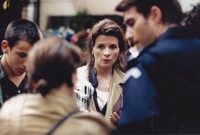 contemptuously throws a screwed-up piece of paper at a woman who is
begging on a street corner. From this one point, the characters'
lives follow—as the subtitle alludes to—different paths.
contemptuously throws a screwed-up piece of paper at a woman who is
begging on a street corner. From this one point, the characters'
lives follow—as the subtitle alludes to—different paths.
Anne is trying to make it as a film actress while her boyfriend,
Georges, tries to make sense of his profession as a photographer (we
are presented first with his stark images of war, taken in Kosovo,
and then with an arresting series of shots taken of unsuspecting passengers on the Paris Metro). Georges' brother, Jean, is meanwhile
trying to escape from the influence of his father who wants him to
take over the family farming business.
Maria, the Romanian beggar at whom Jean callously discards his
rubbish, is caught without papers and deported. Back at home she boasts
she had a good job as a teacher in Paris and, unphased by the
ignominy of the experiences she has gone through, pays money to be
smuggled back into fortress Europe again.
The other main protagonist is Amadou, an angry young man of
African origin, whom we meet when he takes offence at Jean's treatment
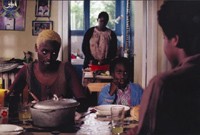 of Maria. Aside from this street fight, we see him talking to a friend explaining who his father arrived in France and also to his
younger sister, who is deaf, in sign language about why their father left. of Maria. Aside from this street fight, we see him talking to a friend explaining who his father arrived in France and also to his
younger sister, who is deaf, in sign language about why their father left.
Finally, these paths converge again for the film's ending, with
its prosaic action dramatically set against drumming music being
played by the children at the deaf school where Amadou teaches.
In a mirror of the film's main opening sequence, Georges arrives
at Anne's flat to find that he no longer knows the security code
(presumably the source of the film's title) and is thus denied entry
to the sanctuary he requires—a metaphor for the film's wider concerns.
Meanwhile, Maria is back on her old street corner.
Alienating fragmentation
Code inconnu is in some ways related to the third film of Haneke's
"emotional glaciation" trilogy, 71 Fragmente einer Chronologie
des Zufalls (71 Fragments of
a Chronology of Chance, 1994) which also uses a dislocated mosaic
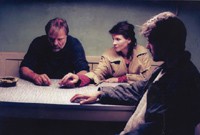 structure to link characters to a single event (a motiveless killing
spree in a Vienna bank by a disaffected student). The return to this
style is intriguing. 71 Fragmente is by far the least
successful of
Haneke's trilogy, not in box office terms but in its ability to
challenge us intellectually. structure to link characters to a single event (a motiveless killing
spree in a Vienna bank by a disaffected student). The return to this
style is intriguing. 71 Fragmente is by far the least
successful of
Haneke's trilogy, not in box office terms but in its ability to
challenge us intellectually.
It is hardly surprising, then, that the criticisms that could be levelled
at 71 Fragmente also resonate with Code inconnu. Both
are horribly
dry exercises in intellectualism and lack what might be termed the
"intellectually visceral" quality of Funny Games or the
second of
Haneke's trilogy, Benny's Video (1992), both of which
challenge our
gut instincts rather than our most abstract thoughts. Moreover, Haneke seems so wrapped up in the formal qualities
of Code inconnu that the very human message he is trying to
give out
is totally lost.
Even discounting this alienating factor, the film somehow fails to
work, it sitting uncomfortably in the shadow of 71 Fragmente
trying
hard not to look like a derivative work. "I'm playing with the
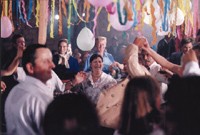 public, and I make them fall into all kinds of traps and show them
they've fallen into the trap," the director explained in the May
edition of Sight and Sound. public, and I make them fall into all kinds of traps and show them
they've fallen into the trap," the director explained in the May
edition of Sight and Sound.
But this is Haneke's sixth feature
film, and he is running out of mechanisms to force us to question the
power of film as a medium. He resorts to tactics that are
now seemingly commonplace in his films, such as suddenly cutting off
the dialogue mid-sentence. Even worse, he employs techniques that
are universally clichéd, such as showing the making of a film within
the film we are watching and trying to confuse us as to which level we
are looking at. This, quite frankly, is old hat.
Pulling apart the definitions
Putting aside such concerns over form, however, the way Haneke
pieces together his mosaic with steadfast neutrality is remarkable.
Time and time again he seeks to present something as "truth" and then
undermine it. His philosophical aims (Haneke studied philosophy at
university) are to force us to question first the reality we see in
the film and—rather more ambitiously—the reality we see around us. In
one scene, Anne and Georges have an argument. To force her lover's
position, Anne tells him she is pregnant, but then denies it. We have
no way of knowing which version is true.
As such, Haneke has no answers to give us on immigration or
multiculturalism. He merely urges us to question the reality of the
issues around it. In this he does, perhaps, have a major point.
Immigration is largely a seen as a subject for political debate and a
topic that dominates newspaper headlines. Rarely do we stop to
consider the stories of the people behind the statistics, who they
are and how the single word "immigrant" describes a multitude of
experiences.
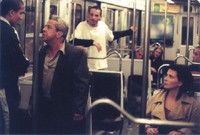 If there is anything positive Haneke's film can achieve it should
be to force us to abandon our predefined and narrow definitions of
"immigration" and "multiculturalism" and make us find meaning for
them again based on what we see, not on what newspapers tell us.
"What matters is the end result," Georges tells us in one of his
monologues, and that could be a kind of motto for the film, urging
us to look at each situation anew and not fall into the trap of
placing things in predefined pigeon holes. If there is anything positive Haneke's film can achieve it should
be to force us to abandon our predefined and narrow definitions of
"immigration" and "multiculturalism" and make us find meaning for
them again based on what we see, not on what newspapers tell us.
"What matters is the end result," Georges tells us in one of his
monologues, and that could be a kind of motto for the film, urging
us to look at each situation anew and not fall into the trap of
placing things in predefined pigeon holes.
But
curiously, if anything, the film's analysis of the lack of community
and communication in multicultural Paris seems to have had the
opposite of the intended effect. In France, at least, the film has
attracted the
admiration of the right, as opposed to the usual left-wing gang who
admire Haneke's brand of philosophy.
Perhaps all this explains why Haneke's most recent film La
pianiste (The Piano Teacher, 2001), which just last week scooped
three
awards at Cannes (including the Grand Prix), returns to the
visceral style that characterised Funny Games. Indeed, the
director seems to have
gone from one wild extreme to the other, and La pianiste has been
criticised for being pornographic, degrading and too reliant on
excessive violence. It will be interesting to see distributors
wrestle with the conflicting desires to appease public good
taste by keeping the film off our screens and to make loads of loot
by cashing in on a major prize.
Doubtless, in the meantime, Code inconnu will receive
something of
a boost from its successor's fame (Code inconnu opened in the UK on 25
May) and some punters will be attracted merely by the presence of art
house pin-up Juliette Binoche in the cast list. However, it is
unlikely that the film itself is going to turning much of the cinema-
going public into a new wave of Haneke fans.
Andrew James Horton, 28 May
2001
Corrections added 4 June. Thanks to Thibaut Lespagnol of the College of Europe, Brugges, for pointing out the errors.
Also of interest:
Moving on:
|




 contemptuously throws a screwed-up piece of paper at a woman who is
begging on a street corner. From this one point, the characters'
lives follow—as the subtitle alludes to—different paths.
contemptuously throws a screwed-up piece of paper at a woman who is
begging on a street corner. From this one point, the characters'
lives follow—as the subtitle alludes to—different paths.
 of Maria. Aside from this street fight, we see him talking to a friend explaining who his father arrived in France and also to his
younger sister, who is deaf, in sign language about why their father left.
of Maria. Aside from this street fight, we see him talking to a friend explaining who his father arrived in France and also to his
younger sister, who is deaf, in sign language about why their father left.
 structure to link characters to a single event (a motiveless killing
spree in a Vienna bank by a disaffected student). The return to this
style is intriguing. 71 Fragmente is by far the least
successful of
Haneke's trilogy, not in box office terms but in its ability to
challenge us intellectually.
structure to link characters to a single event (a motiveless killing
spree in a Vienna bank by a disaffected student). The return to this
style is intriguing. 71 Fragmente is by far the least
successful of
Haneke's trilogy, not in box office terms but in its ability to
challenge us intellectually.
 public, and I make them fall into all kinds of traps and show them
they've fallen into the trap," the director explained in the May
edition of Sight and Sound.
public, and I make them fall into all kinds of traps and show them
they've fallen into the trap," the director explained in the May
edition of Sight and Sound.  If there is anything positive Haneke's film can achieve it should
be to force us to abandon our predefined and narrow definitions of
"immigration" and "multiculturalism" and make us find meaning for
them again based on what we see, not on what newspapers tell us.
"What matters is the end result," Georges tells us in one of his
monologues, and that could be a kind of motto for the film, urging
us to look at each situation anew and not fall into the trap of
placing things in predefined pigeon holes.
If there is anything positive Haneke's film can achieve it should
be to force us to abandon our predefined and narrow definitions of
"immigration" and "multiculturalism" and make us find meaning for
them again based on what we see, not on what newspapers tell us.
"What matters is the end result," Georges tells us in one of his
monologues, and that could be a kind of motto for the film, urging
us to look at each situation anew and not fall into the trap of
placing things in predefined pigeon holes.

